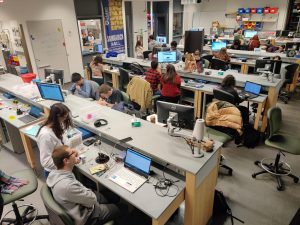A new series of short videos on the BE Labs Youtube Channel highlights the unique and innovative approach to engineering education found in The George H. Stephenson Foundation Educational Laboratory & Bio-MakerSpace, the primary teaching lab for the Department of Bioengineering at Penn Engineering. This video series explores how “engineering is fundamentally interdisciplinary” and demonstrates the ways in which Penn students from Bioengineering and beyond have combined the fields of biology, chemistry, and electrical, mechanical, and materials engineering into one exciting and dynamic “MakerSpace.”
“Our Bio-MakerSpace” takes viewers on a tour inside BE’s one-of-a-kind educational laboratories.
Produced primarily on smart phones and with equipment borrowed from the Penn Libraries, and software provided by Computing and Educational Technology Services, the videos were made by rising Bioengineering junior Nicole Wojnowski (BAS ‘22). Nicole works on staff as a student employee of the BE Labs and as a student researcher in the Gottardi Lab at the Children’s Hospital of Philadelphia (CHOP), helmed by Assistant Professor of Pediatrics Riccardo Gottardi.
Sevile Mannickarottu, Director of the Educational Labs in Bioengineering, says that the philosophy of the Bio-MakerSpace “encourages a free flow of ideas, creativity, and entrepreneurship between Bioengineering students and students throughout Penn. We are the only open Bio-MakerSpace with biological, chemical, electrical, materials, and mechanical testing and fabrication facilities, all in one place, anywhere.”
Previous stories on the BE blog have gone into detail about how BE’s Bio-MakerSpace has become a hub for start-ups in recent years, how students can build their own makerspace for under $1500, and more. Major award-winning start-ups including Strella Biotechnology and InstaHub got their start in the BE Labs.
To learn more about the Bio-MakerSpace, check out the other videos below.
Katherine Sizov (Biology ‘19), founder of the 2019 President’s Innovation Prize (PIP) award-winning company Strella Biotechnology, discusses how the Bio-MakerSpace is a hub for interdisciplinary innovation.
Bioengineering doctoral student Dayo Adewole co-founded the company Instahub, which also took home a PIP award in 2019. Dayo also graduated from the BE undergraduate program in 2014. In this video, he discusses the helpfulness and expertise of the BE Labs staff.
Senior Associate Dean for Penn Engineering and Solomon R. Pollack Professor in Bioengineering David Meaney discusses how the Bio-MakerSpace is the only educational lab on campus to provide “all of the components that one would need to make the kinds of systems that bioengineers make.”

 The
The